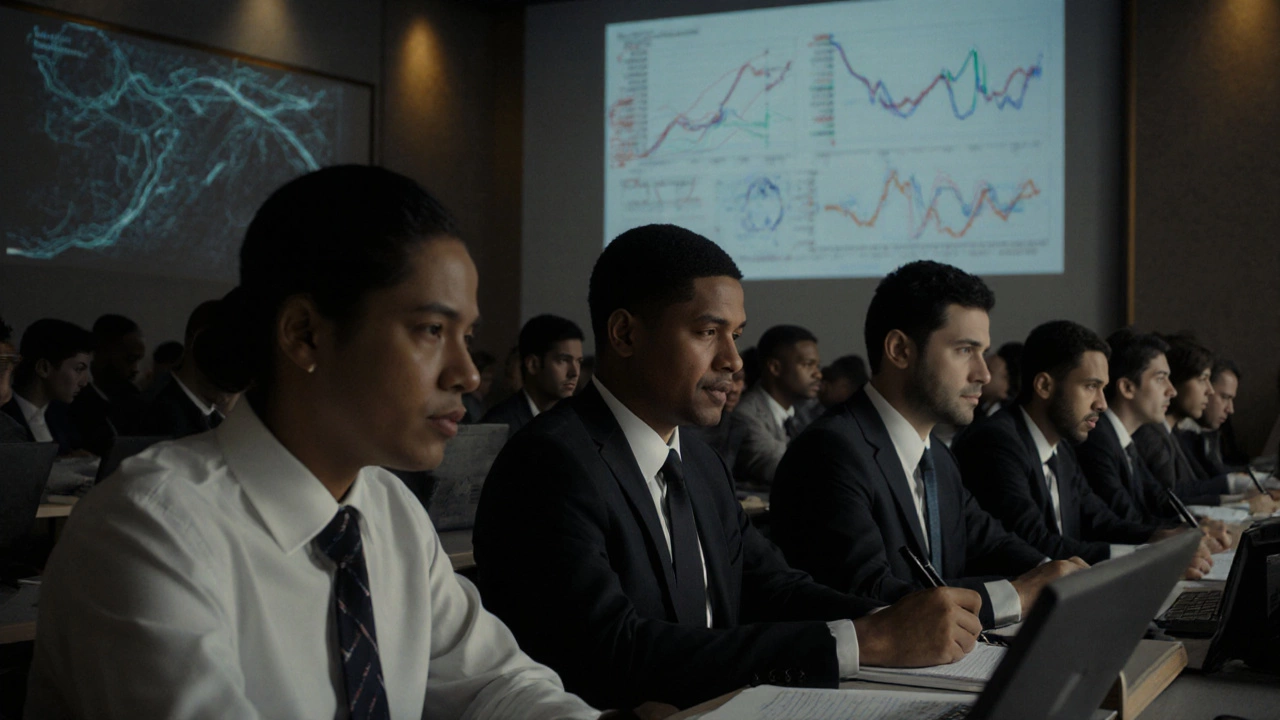What Is the Hardest Certification to Get? Top 5 Most Demanding Exams Worldwide
 Nov, 3 2025
Nov, 3 2025
When people ask what the hardest certification to get is, they’re not just curious-they’re often weighing their own future. Maybe you’re thinking about switching careers, climbing the corporate ladder, or stepping into a high-stakes profession. The truth? Some certifications don’t just test your knowledge. They test your endurance, your discipline, and your ability to survive months-or years-of relentless pressure.
The CPA Exam: A Marathon in Disguise
The Certified Public Accountant (CPA) exam is one of the most grueling professional certifications in the U.S. and globally recognized. It’s not just about knowing accounting rules. You’re expected to master four sections: Auditing and Attestation (AUD), Business Environment and Concepts (BEC), Financial Accounting and Reporting (FAR), and Regulation (REG). Each section is four hours long. That’s 16 hours of testing, spread across a single day or over multiple sessions.
Pass rates hover around 50% per section. Many candidates take 12 to 18 months to clear all four parts. The exam doesn’t just ask for memorization-it demands application. You’ll get case studies where you have to spot fraud in financial statements, calculate tax implications under complex scenarios, or evaluate internal controls in a simulated company. The American Institute of CPAs (AICPA) updates the exam every year to reflect real-world changes in tax law and auditing standards. If you’re not studying 20-30 hours a week while holding a full-time job, you’re already behind.
The CFA Charter: The Triple Threat
If the CPA is a marathon, the Chartered Financial Analyst (CFA) program is a triathlon with no finish line in sight. To earn the CFA charter, you must pass three levels of exams, each taken one year apart. Level I is multiple choice. Level II is item set questions-mini case studies. Level III combines essay writing with portfolio construction. You need at least four years of relevant work experience on top of that.
Pass rates? They’ve been below 40% for Level I in recent years. For Level III, it’s often around 50%. The curriculum covers everything from ethics and quantitative methods to derivatives, fixed income, and behavioral finance. You’re expected to know how to value a company using discounted cash flow models, interpret macroeconomic trends, and apply global investment standards-all while maintaining strict ethical boundaries. The CFA Institute doesn’t just want experts. They want professionals who can be trusted with billions in client assets.
Most candidates spend 300+ hours per level. That’s over 900 hours total. Many work full-time in finance, study during lunch breaks, and sacrifice weekends for months on end. It’s not uncommon for someone to spend $5,000-$10,000 in exam fees and prep materials alone.
The U.S. Bar Exam: Legal Mastery Under Pressure
Passing the bar exam isn’t just about knowing the law-it’s about surviving the psychological weight of it. In the U.S., each state sets its own bar exam, but the Uniform Bar Exam (UBE) is used in over 40 jurisdictions. It includes the Multistate Bar Exam (MBE), the Multistate Essay Exam (MEE), and the Multistate Performance Test (MPT).
The MBE alone has 200 multiple-choice questions covering seven subjects: constitutional law, contracts, criminal law, evidence, real property, torts, and civil procedure. You have six hours to finish it. The MEE asks you to write six 30-minute essays on topics ranging from agency law to bankruptcy. The MPT forces you to act like a junior attorney-drafting a motion, memo, or client letter based on a fictional case file, all within 90 minutes.
Pass rates vary by state. In California, the pass rate for first-time takers in 2024 was just 40%. In New York, it’s around 70%. But don’t be fooled-those numbers hide the reality: tens of thousands of law graduates sit for the exam every year. Many retake it multiple times. Some spend over a year studying. Others lose jobs, relationships, or mental health in the process. The bar exam doesn’t just test knowledge. It tests whether you can perform under extreme stress, with no room for error.

The USMLE: Becoming a Doctor Is a War of Attrition
If you think medical school is hard, wait until you face the United States Medical Licensing Examination (USMLE). It’s a three-step process that spans years. Step 1 tests foundational sciences-pharmacology, microbiology, pathology, biochemistry. Step 2 CK (Clinical Knowledge) assesses your ability to apply medical knowledge in patient care. Step 2 CS (Clinical Skills) was discontinued in 2021, but Step 3 tests your ability to manage patients independently.
Step 1 used to be the gatekeeper. Scores above 250 were considered competitive for top residencies. In 2022, it became pass/fail-but that didn’t make it easier. The exam still covers over 6,000 topics. You’re expected to know drug interactions, rare disease presentations, and diagnostic algorithms for conditions you’ve only seen in textbooks.
Most students spend six to eight months preparing for Step 1. They use resources like UWorld, First Aid, and Pathoma. They take practice exams daily. Many report sleep deprivation, anxiety, and burnout. The pass rate is high-around 95% for U.S. graduates-but that’s misleading. The real challenge is not passing-it’s scoring well enough to get into the specialty you want. Neurosurgery, dermatology, orthopedics: those fields demand scores in the top 5%. That means you’re competing against the best of the best.
The Chartered Engineer (CEng) in the UK: Engineering Excellence Under Scrutiny
Outside the U.S., the Chartered Engineer (CEng) designation from the UK’s Engineering Council is among the most respected-and toughest-engineering certifications. It’s not just about having a degree. You need an accredited MEng (Master of Engineering) or equivalent, plus four to six years of supervised professional experience.
The real hurdle? The Professional Review Interview. You must submit a detailed technical report and then defend it in front of a panel of senior engineers. They’ll grill you on design decisions, safety standards, project management, and ethical responsibilities. You need to prove you can lead teams, manage risk, and apply engineering principles in real-world contexts.
Success rates are below 60%. Many candidates fail the first time-not because they don’t know their engineering, but because they can’t articulate their experience clearly. The panel doesn’t want rehearsed answers. They want depth, honesty, and critical thinking. If you’ve ever led a bridge retrofit, designed a sustainable water system, or optimized a manufacturing line, you’ll need to show how you solved problems, not just followed procedures.

Why Do People Even Try?
These certifications aren’t easy because they’re designed to be gatekeepers. They exist to protect the public. You wouldn’t want a doctor who passed a 50-question quiz. You wouldn’t trust your finances to an accountant who studied for two weeks. These exams ensure that only those who’ve truly earned it can hold titles like CPA, CFA, or Chartered Engineer.
But here’s the thing: the difficulty isn’t the point. The point is the transformation. People who complete these exams don’t just get a credential. They gain a new identity. They become the kind of professional others turn to when everything’s on the line. That’s why, despite the stress, the cost, and the exhaustion, tens of thousands still show up every year.
Is There a ‘Hardest’ One?
There’s no single answer. The CPA is brutal if you’re not a numbers person. The CFA is overwhelming if you hate ethics and portfolio theory. The bar exam breaks people who can’t write under pressure. The USMLE is crushing if you struggle with memorization. The CEng is punishing if you can’t communicate your expertise.
The hardest certification is the one that doesn’t match your strengths. If you’re a visual learner, the CFA’s dense text might kill you. If you’re introverted, the CEng interview could be your nightmare. If you hate writing, the bar exam will feel like torture.
So ask yourself: not what’s the hardest-but what’s the right one for you?
Is the CPA exam harder than the bar exam?
It depends on your background. The CPA exam is more technical and covers a broader range of accounting topics, while the bar exam demands strong writing and analytical skills under time pressure. CPA pass rates are slightly higher, but the bar exam has a reputation for being more psychologically taxing due to its essay-heavy format and high stakes for career outcomes.
Can you pass the CFA without studying full-time?
Yes, but it’s rare. Most successful candidates work full-time and study 15-25 hours per week for 6-9 months per level. The key is consistency-not cramming. People who study in short bursts, use spaced repetition, and take timed practice exams have the highest success rates. If you’re working 50-hour weeks, you’ll need to sacrifice weekends and social events.
What’s the most failed certification exam?
The California Bar Exam has the lowest pass rate among major certifications, often below 40% for first-time takers. For professional certifications, the CFA Level I consistently has one of the lowest pass rates, around 35-40% in recent years. These exams aren’t designed to be easy-they’re designed to filter out those who aren’t fully committed.
How long does it take to get a CEng designation?
It typically takes 6 to 8 years total. You need an accredited Master’s degree (4 years), then 4-6 years of supervised professional experience, plus time to prepare your technical report and interview. Many engineers start the process after 3-4 years in the field, but the full journey from graduation to Chartered status often spans a decade.
Are these certifications worth the effort?
For the right person, yes. CPAs earn 10-15% more on average than non-certified accountants. CFA charterholders in investment roles often see salary jumps of $20,000-$50,000. Bar passers qualify for top-tier law firms or public service roles. USMLE success opens doors to elite medical residencies. CEng status gives engineers authority in project leadership and international recognition. The cost is high-but so is the return, if you’re in the field.
What Comes Next?
If you’re considering one of these certifications, start by talking to someone who’s already earned it. Ask how they studied, what they regretted, and what surprised them. Don’t just read reviews online-get real stories. Then, map your own strengths and weaknesses against the exam’s structure.
Don’t chase the hardest one. Chase the one that aligns with your goals, your discipline, and your life. The hardest certification isn’t the one with the lowest pass rate. It’s the one you quit halfway through because you didn’t believe in it enough.